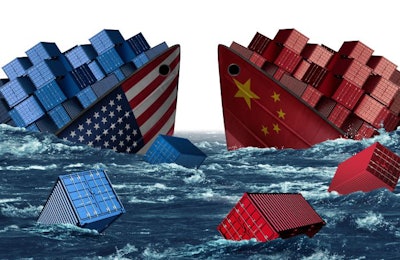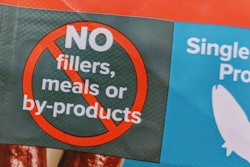
Dog and cat owners in China are hoarding United-States-made pet foods, as the trade war between Earth’s two largest economies continues, reported the New York Times. One dog owner purchased 200 pounds of Canidae dog food for her own and her boyfriend’s dogs. Since May, “revenge-minded” officials in China have delayed shipments of U.S. pet food imports at customs checkpoints, according to unnamed experts.
Chinese pet food tariffs set back US export progress
As of July 6, pet food exports from the United States to China became subject to a 25 percent tariff, and the escalating trade war between the planet’s two largest economies worries experts at the Pet Food Institute (PFI).
“PFI was disappointed to learn that China decided to retaliate against US exports, and we are alarmed that pet food was included in their retaliatory tariff list, becoming subject to a 25 percent tariff effective July 6,” said Peter Tabor, PFI vice president of regulatory and international affairs, told Petfood Industry. “While China has been a small but growing export market for U.S. pet food makers, these tariffs pose yet another barrier to a nearly US$2 billion pet food market.”
Escalating trade tensions, including NAFTA, steel and aluminum tariffs and retaliatory tariffs from China, may seriously affect US pet food makers by threatening both current and future foreign market access and increasing the costs of key packaging and equipment materials, he said.
“For example, while some pet food makers may choose to absorb some of the added costs from increased tariffs on steel tinplate used for canned products, many will be forced to pass along these increased costs to pet-owning households,” Tabor said.
Tariffs’ effects on pet food ingredient and materials pricing
On July 20, CNBC published an interview in which United States President Donald Trump expressed willingness to expand tariffs onto all Chinese exports to the United States. Along with this, negotiations between the United States, Canada and Mexico continue over the fate of the North American Free Trade Agreement. With the state of international trade in flux, many United States agricultural products may face reduced foreign demand, possibly resulting in an overabundance in the US market and potentially lower domestic prices. However, temporarily lower pet food ingredient prices won’t benefit the US pet food industry in the long run, said Tabor.
“There is really no net benefit to domestic pet food makers from either US tariffs or retaliatory tariffs imposed by export markets,” he said. “Our priority is advocating for fair and predictable international trade that supports US agricultural producers, pet food exports and job creation across all industries. Pet food and treat makers play an important role in adding value to agricultural goods grown for human consumption. If the trend of imposing tariffs on our trading partners and resulting retaliation continues, we will ultimately see reduced agricultural production in the United States, which will negatively impact food and agriculture producers up and down the supply chain, including pet food makers.”
Pet food tariffs effects on companies active in China
“To be clear, China’s retaliatory tariffs are a step backward, not only because they increase costs of our products in China,” said Tabor. “We have sought since 2003 to regain full Chinese market access following the BSE [bovine spongiform encephalopathy] incident in late 2003. China reopened its market to US beef for human consumption last year but has refused to do so for pet food, despite overwhelming scientific evidence that U.S. pet food is safe. These newly-enacted tariffs pose yet another hurdle for American pet food makers already exporting to China and those seeking market access.
“China represents an incredible opportunity for US pet food makers and PFI has been active for years in supporting broader market access. PFI’s own estimates indicate it could become our #2 export market if China removes unscientific barriers to our products. Unfortunately, China’s retaliatory tariffs represent a step backward in progress, and PFI has been actively communicating our concerns to key policymakers in the Trump administration and Congress.”
Chinese pet food buyers consider boycott of US imports
Some Chinese pet owners are considering boycotting pet foods imported from the United States, reported Global Times. Chinese pet owners stated that they are considering shifting to domestic products or pet foods imported from other nations affected by US tariffs.
One pet owner in Beijing told the Global Times that the price of Natural Balance had increased from CNY380 (US$55.21) for a 15-pound bag to CNY430 (US$62.47) on Alibaba’s e-commerce website Tmall. She also stated that the trade war had been instigated by the US and that buying US imports made her “kind of sick.”

















